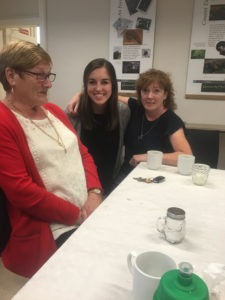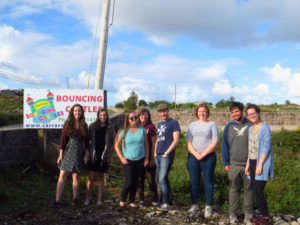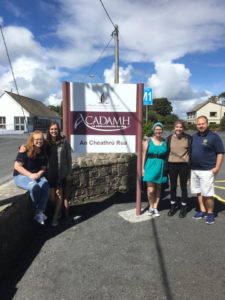As I finish the course this week, I am trying to assess how much I have learned and how much I have improved. I realized that even with moving up to the Intermediate course, most everything I did grammar-wise was a review. I didn’t learn any new tenses or structures. At first, this felt disappointing. I obviously wasn’t at the Advanced course level, however, I felt as if by not learning new grammar I had somehow been cheated out of material. However, in conversing with native speakers, I am understanding most of what they say and rather than needing sentences translated to English, I just need them to be said slower. In my responses, I don’t need any more advanced structures to have a conversation understood by both parties. While I am nowhere near fluency yet, I am able to hold conversations for long periods of time. I didn’t miss out by not learning any new grammar. Rather, I cemented the structures I had been taught and can now use them with ease and without mixing up tenses. Before moving on to Intermediate Irish at Notre Dame, this is exactly what I need.

The lack of new grammar relates to one of my goals at the beginning of the summer “advance by the equivalent of one semester at Notre Dame.” Because of the lack of introduction of new grammar structures, I can’t say that I have advanced by the equivalent of one semester. Academically, I would not be able to enter into Intermediate II rather than I. However, I don’t consider this a failure because I am a more well rounded conversationalist and have so far exceeded some of my other goals. One of my other goals was to speak only Irish in my host family’s house, and although conversation in our rooms upstairs was mostly English, I was one of the only people who made an effort to only speak to the bean an tí in Irish and to initiate conversations with her. (Secretly, I think I was her favorite). I was able to converse without resorting to English most of the time. I also would speak with her mother who was around the house all the time. My final goal was to initiate a conversation with a native speaker and speak only in Irish, and this was accomplished a couple of times in the summer, between speaking to my bean an tí and her mother and also to the native speakers in pubs.

This course has inspired me to start looking into Irish language night courses in Dublin while I am abroad this next semester. Between just my semester at school and the SLA program, I felt like I had lost so much vocabulary and conversation ability. I don’t want that to happen again before my next semester in January. I had always planned on joining an Irish language club to keep up some conversation skills, but I want to take it a little bit further and continue learning. I feel that if I take a class, I can push myself to correct the mistakes I keep making, rather than continuing at my level likely making (and possibly cementing) grammatical mistakes.
The biggest question I have had to answer about my choice to spend a month doing an SLA is “Why Irish” (Besides, of course, the questions “Irish is a language?” or “Isn’t that called Gaelic?”). The answer to that question isn’t so much about defending the usefulness of a language that is primarily spoken in rural Ireland and which I likely won’t be directly using in my career. Studying this language was about experiencing the cultural value of a language. Every person I met in Carraroe could speak English. Learning and speaking Irish at home, at church, at the shop, and at the pubs was a conscious choice that they were making. They use the Irish language because it is an important part of their identity and they host students and help them learn Irish because they believe it is an important part of the country’s identity. I have such a greater appreciation for language as more than just a means of communication and rather an expression of identity.

